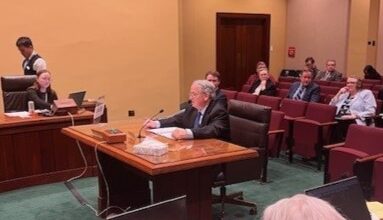RVDA’s Ingrassia Talks ‘New Outlook’ on Legislative Issues
The following column was written by Phil Ingrassia, president of the RV Dealers Association (RVDA), and originally published in the December issue of RV Executive Today.

November’s election brought some significant shifts to the legislative and policy landscape for the RV industry and all of outdoor recreation. A renewed effort to enact the Travel Trailer & Camper Tax Parity Act, the EXPLORE Act, proposed actions related to motor vehicle emissions, and tariffs are all topics that could have significant impacts on RV dealers, manufacturers and consumers.
Travel Trailer & Camper Tax Parity Act
One of the most pressing legislative actions in the RV industry is the Travel Trailer & Camper Tax Parity Act, which seeks to level the playing field between RVs and other types of motor vehicles in the eyes of federal tax policy. This bill is strongly supported by the RVDA and the RV Industry Association (RVIA), both of which are advocating for Congress to act swiftly. Under current tax rules, the floorplan interests for travel trailers are taxed differently compared to motor vehicles, even though they serve similar recreational purposes. This disparity results in an unfair tax burden for some RV dealers. The Travel Trailer & Camper Tax Parity Act aims to correct this imbalance, ensuring RV trailer floorplan interest is taxed in the same manner as other motor vehicles – reducing the financial burden on both dealers and consumers.
The EXPLORE Act: Boosting Outdoor Recreation Opportunities
Alongside tax parity, another key initiative gaining traction is the EXPLORE Act, a piece of legislation that aims to expand access to outdoor recreation opportunities on public lands. Supported by various stakeholders within the outdoor recreation and RV industries, including the Outdoor Recreation Roundtable, RVDA and RVIA, the legislation would enhance the availability of campsites, improve roads and trails, and modernize the overall infrastructure on public lands.
Trump Administration Action on Motor Vehicle Emissions
A significant and somewhat uncertain issue for the RV and broader automotive industry is the outlook for potential changes in motor vehicle emission standards under the incoming administration, particularly considering the Trump Administration’s past approach to emission regulations. During its previous tenure, the Trump Administration sought to roll back stricter vehicle emissions standards that had been set under the Obama Administration. The rollback included both fuel economy standards for light- duty vehicles and greenhouse gas emissions rules that were seen as essential for tackling climate change. However, with the transition to a new administration, the future of these policies is in flux. Fuel efficiency and emissions requirements have contributed to the development of electric motorhomes or hybrid RVs prototypes, but they are only prototypes at this point. The balance between environmental concerns and the economic feasibility of these technologies will remain a key consideration for manufacturers.
Tariffs: Potential Impacts on RV Manufacturers
Tariffs have long been a point of contention in global trade, and the incoming administration has signaled it will potentially revise tariff policies that could impact the RV industry.
Over the past few years, tariffs on materials such as steel, aluminum and other components have affected RV manufacturers as well as suppliers. The RV industry will be looking closely at how the new administration and Congress approach various trade agreements as manufacturers and suppliers work to make the material and component parts supply chain as efficient as possible.
As the RV industry looks to the future, it faces a host of challenges and opportunities in legislative and policy circles. From tax parity for travel trailers to increased access to public lands for outdoor recreation, the potential for positive change is significant. Organizations like the RVDA and RVIA are playing a vital role in shaping these discussions, working to ensure that policies support the growth of the RV sector while balancing environmental and economic factors. The coming years will likely see ongoing debates and potential policy shifts, but with strong advocacy and continued engagement, the RV industry can position itself for success in an evolving landscape.


